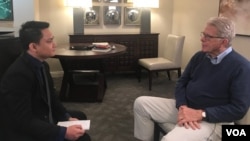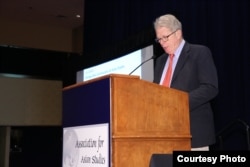David Chandler, a renowned American historian of Cambodia, says he is looking into publishing a 5th edition of his seminal 1983 work “A History of Cambodia” with a more pessimistic ending.
“The new edition, if I go ahead with it, and I think I probably will, is going to be different from the 4th edition,” Chandler said in an exclusive interview with VOA Khmer last month.
“I have a feeling that the closing pages of that last chapter, which would take you to 2018 or 2019, whenever I finish writing the book, would be more pessimistic than the last paragraphs were in the 4th edition,” he said.
Chandler saw positive changes in terms of liberalization and democratization when he was concluding the current version of the book, which was last revised in 2007, but in the past decade Cambodia has taken backward steps, he said.
At that time, he explained, “I just saw more possibilities for positive political changes in Cambodia …opening up and liberalizing and so on. I saw more of them in 2005 when I wrote the last edition than I do now. I think the political scene has contracted and it’s become less open to a positive change, or democratization.”
Chandler also wants to broaden his chapter about the Angkor Empire, the period from the 9th to 15th centuries when a kingdom centered in Siem Reap conquered large swathes of Southeast Asia and built vast temples, to include new archeological findings brought about by University of Sydney’s Greater Angkor Project. This new research utilizes the airborne laser-scanning technology known as Lidar to map small hills and depressions surrounding the temples, which allows archaeologists to visualize the extent of the settlements around Angkor and gives new insight into the lives of everyday Angkorians.
“I am going to expand and deepen the Angkor chapter because the archaeological work has been wonderful. The work in the last 10 years has been big leaps with the Lidar, big leaps of Cambodian knowledge about Angkor,” he said.
In 1960, Chandler, now an 85-year-old professor emeritus at Monash University in Australia, came to work as a US Foreign Service officer at the US Embassy in Phnom Penh. Learning to speak and read Khmer there, and following then-Prince Norodom Sihanouk around the country to observe his speeches, allowed Chandler to glean insights about Cambodia’s history and political dynamics that prepared him for his future career as a historian.
Translated into Khmer, Thai, French and Chinese, and used in classrooms across the world, Chandler’s “A History of Cambodia” is a comprehensive overview of Cambodia that explores four main themes: Cambodia’s geographical relations with Thailand and Vietnam; modern Cambodian interpretations of the nation’s past, especially the Angkor Empire; patronage and hierarchy practices in Cambodia; and the idea of changelessness in Cambodian society.
The Association for Asian Studies last month gave Chandler its highest honor, the award for Distinguished Contributions to Asian Studies, for his body of scholarly work on Cambodia’s history, politics and culture, of which “A History of Cambodia” is perhaps the best known.
Soon after the first edition was published, the Association’s Journal of Asian Studies praised the book as an “original contribution, superior to any other existing work.”












